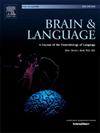Word and morpheme frequency effects in naming Mandarin Chinese compounds: More than a replication
IF 2.3
2区 心理学
Q1 AUDIOLOGY & SPEECH-LANGUAGE PATHOLOGY
引用次数: 0
Abstract
The question whether compound words are stored in our mental lexicon in a decomposed or full-listing way prompted Janssen and colleagues (2008) to investigate the representation of compounds using word and morpheme frequencies manipulations. Our study replicated their study using a new set of stimuli from a spoken corpus and incorporating EEG data for a more detailed investigation. In the current study, despite ERP analyses revealing no word frequency or morpheme frequency effects across conditions, behavioral outcomes indicated that Mandarin compounds are not sensitive to word frequency. Instead, the response times highlighted a morpheme frequency effect in naming Mandarin compounds, which contrasted with the findings of Janssen and colleagues. These findings challenge the full-listing model and instead support the decompositional model.
汉语普通话化合物命名中的词频和词素频率效应:不仅仅是复制。
复合词是以分解还是全列的方式存储在我们的心理词典中,这一问题促使 Janssen 及其同事(2008 年)使用词和语素频率操作来研究复合词的表征。我们的研究复制了他们的研究,使用了一组来自口语语料库的新刺激,并结合脑电图数据进行了更详细的调查。在目前的研究中,尽管ERP分析表明在不同条件下没有词频或语素频率效应,但行为结果表明普通话复合词对词频并不敏感。相反,在命名普通话化合物时,反应时间凸显了语素频率效应,这与 Janssen 及其同事的研究结果形成了鲜明对比。这些发现对全列模式提出了质疑,而支持分解模式。
本文章由计算机程序翻译,如有差异,请以英文原文为准。
求助全文
约1分钟内获得全文
求助全文
来源期刊

Brain and Language
医学-神经科学
CiteScore
4.50
自引率
8.00%
发文量
82
审稿时长
20.5 weeks
期刊介绍:
An interdisciplinary journal, Brain and Language publishes articles that elucidate the complex relationships among language, brain, and behavior. The journal covers the large variety of modern techniques in cognitive neuroscience, including functional and structural brain imaging, electrophysiology, cellular and molecular neurobiology, genetics, lesion-based approaches, and computational modeling. All articles must relate to human language and be relevant to the understanding of its neurobiological and neurocognitive bases. Published articles in the journal are expected to have significant theoretical novelty and/or practical implications, and use perspectives and methods from psychology, linguistics, and neuroscience along with brain data and brain measures.
 求助内容:
求助内容: 应助结果提醒方式:
应助结果提醒方式:


